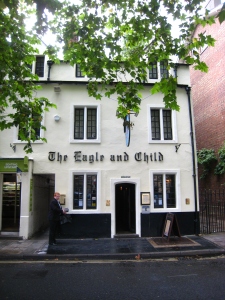
depicts him, as the Narnia narrator Digory Kirke, stepping into a wardrobe.
Ever since I read Mere Christianity in college as a new believer I have been a lifelong admirer of CS Lewis. He may be better known for his children’s series of books, The Chronicles of Narnia, but he wrote other fiction, including a trilogy of science fiction novels, and Lewis was much more than a writer of fiction.
Lewis was a professor, a poet, a critic of English literature, and he was a first-rate Christian thinker with an ability to tease nuanced meaning out of complex ideas with rare clarity in his writing. Having been an atheist up to his 30’s. Lewis came to Christianity with a wealth of knowledge in the classic languages and literature from a scholarly and secular perspective.
His autobiographical book, Surprised by Joy, is a literary cornucopia of allegorical references to the classics. Ancient Greek, Roman, Celtic and Germanic writings were the universe in which his mind operated and found meaning. He was intimately familiar with the myths found in these writings.
When he became a Christian, and he looked back on that wealth of knowledge with new insight, the language of classic literature became the background and (in some ways) the springboard for his belief in “the true myth”, as he came to call it. The “true myth” is the life, death and resurrection of God who became flesh in the person of Jesus of Nazareth.
While Lewis is known for being a Christian apologist in addition to being a writer of children’s fiction, he was first and foremost a scholar of classic literature. He was a lifelong professor of English Literature with tenures at Oxford University (Magdalen College, 1925–1954) and Cambridge University (Magdalene College, 1954–1963). His books include a highly regarded and well-used critique of Paradise Lost and a textbook on Sixteenth Century English literature.
To say that Lewis was a prodigious writer and thinker is to understate the fact. He wrote over 30 books of varying types in addition to his “fulltime job” as a distinguished university professor and sought-after lecturer.
Given the legacy of thought and writing that Lewis generated, one might suppose that Lewis had no time for the more mundane matters of life. One might suppose that his ego was as prodigious as the volume of his writing, and one might be wrong about such suppositions.
Lewis was one of a kind. Born in 1898, Lewis didn’t marry until 1956. One might suppose that bachelorhood allowed him the luxury of time, but Lewis made a different kind of lifetime commitment that infringed greatly on his time. Lewis took in an older woman he didn’t previously know and cared and provided for her until she died.
The backstory is that Lewis and Paddy Moore met as soldiers in the trenches during the Great War (WWI). They made a pact with each other that the survivor of them would take care of the family of the other if one of them did not survive the war. Lewis, himself, was injured and ended his involvement in the war in the hospital, but Paddy Moore went missing and was never found.
True to his word, CS Lewis, who had interrupted his college years to volunteer for the war, took Paddy’s mother and sister in to live with him on a very modest student’s budget. Lewis cared and provided for Mrs. Moore the rest of her life – a total of 30 years – routinely doing the household chores himself. After she developed dementia and was moved to a nursing home, Lewis visited her every day until she passed.
Perhaps because of that care and provision (and very generous charitable giving), Lewis lived a very modest life, but he always found time for hospitality. Lewis was, perhaps, as generous with his hospitality as he was prodigious in his writing and professorial vocation.
When the Germans invaded Poland, Lewis opened up his home to several groups of children forced to evacuate the big cities. Lewis also regularly hosted the Inklings on Thursday evenings in his classroom for nearly two decades. (They met alternately at the Eagle and Child Pub, affectionately known as The Bird and Baby) on Tuesdays at midday).

The Inklings were more or less an ad hoc group of writers and thinkers who met to discuss their literary works in progress and whatever other subjects suited their fancy, often late into the night. J.R.R. Tolkien was a faithful member of this group from the beginning, reading the Lord of the Rings to his fellow Inklings, who critiqued it, before it was published. Including a small handful of regulars, the group included about 15 frequent visitors and another dozen infrequent visitors and guests over the years.
As noted above, Lewis married later in life. The marriage, itself, was an exercise in hospitality. Lewis opened his home to Joy Gresham Davidman, a writer from New York city, and her two sons, David and Douglas. They eventually married in a civil ceremony so she could gain British citizenship. What began as a gesture of generous hospitality, turned into true romantic affection.

They were married a short while later, by a priest this time. Their wedding vows were exchanged in a hospital because Joy developed cancer. They spent four more years together, but cancer eventually claimed her. Their unlikely story is the subject of the movie, Shadowlands, starring Sir Anthony Hopkins and Debra Winger and directed by Sir Richard Attenborough. Lewis also wrote about her death in A Grief Observed.
But all of this is prelude to the real purpose for which I write today. My inspiration comes from Douglas Gresham, one of Joy’s sons, who was very young when he went to live with his mother in the home of CS Lewis.
Continue reading “The Extraordinary Generosity and Hospitality of CS Lewis”